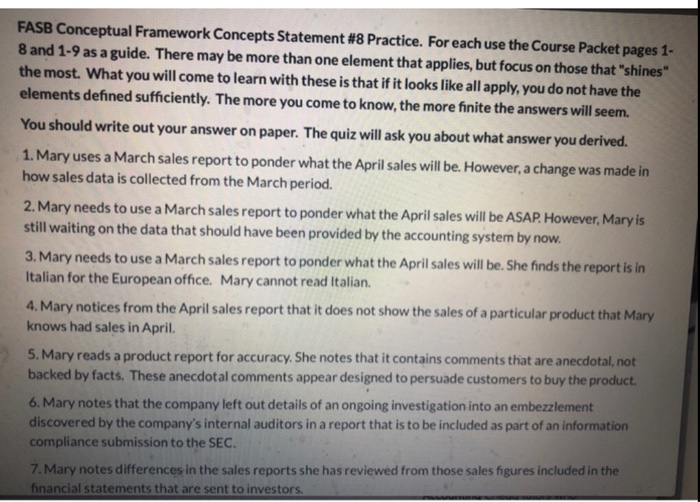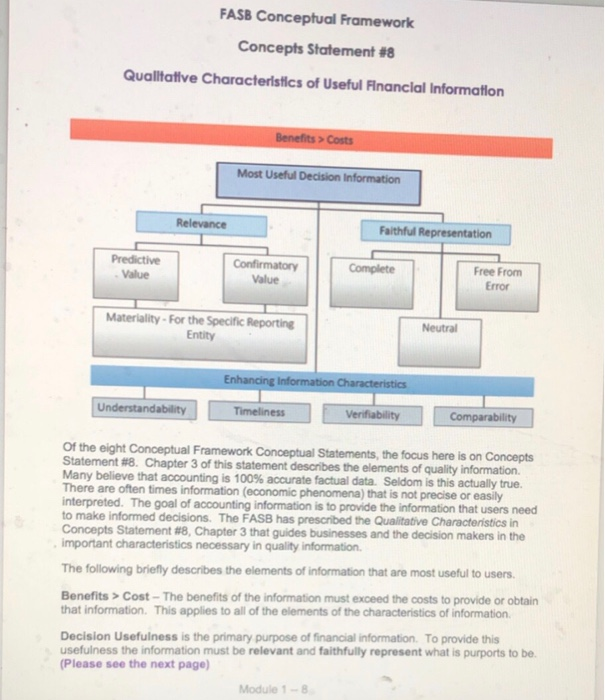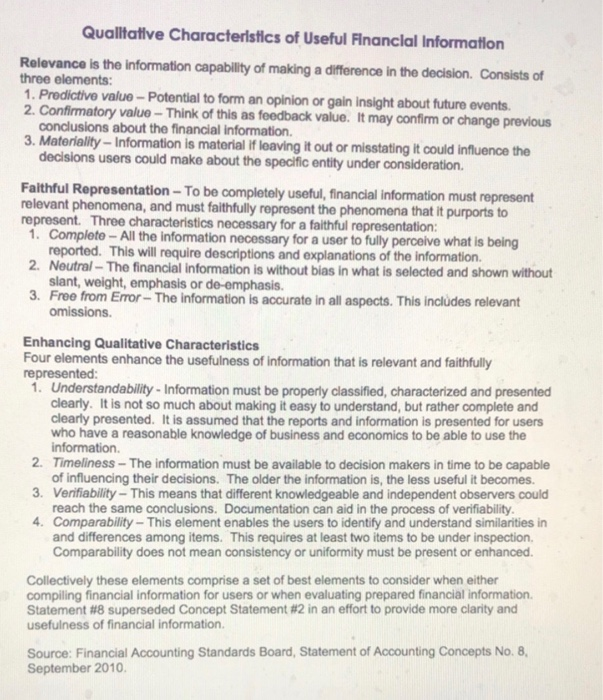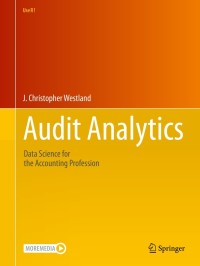FASB Conceptual Framework Concepts Statement #8 Practice. For each use the Course Packet pages 1- 8 and 1-9 as a guide. There may be more than one element that applies, but focus on those that "shines" the most. What you will come to learn with these is that if it looks like all apply, you do not have the elements defined sufficiently. The more you come to know, the more finite the answers will seem. You should write out your answer on paper. The quiz will ask you about what answer you derived. 1. Mary uses a March sales report to ponder what the April sales will be. However, a change was made in how sales data is collected from the March period. 2. Mary needs to use a March sales report to ponder what the April sales will be ASAP. However, Mary is still waiting on the data that should have been provided by the accounting system by now. 3. Mary needs to use a March sales report to ponder what the April sales will be. She finds the report is in Italian for the European office. Mary cannot read Italian. 4. Mary notices from the April sales report that it does not show the sales of a particular product that Mary knows had sales in April. 5. Mary reads a product report for accuracy. She notes that it contains comments that are anecdotal, not backed by facts. These anecdotal comments appear designed to persuade customers to buy the product. 6. Mary notes that the company left out details of an ongoing investigation into an embezzlement discovered by the company's internal auditors in a report that is to be included as part of an information compliance submission to the SEC. 7. Mary notes differences in the sales reports she has reviewed from those sales figures included in the financial statements that are sent to investors. FASB Conceptual Framework Concepts Statement #8 Qualltative Characteristics of Useful Financlal Informatlon Benefits > Costs Most Useful Decision Information Relevance Faithful Representation Predictive Value Confirmatory Value Free From Error Complete Materiality - For the Specific Reporting Entity Neutral Enhancing Information Characteristics Understandability Verifiability Timeliness Comparability Of the eight Conceptual Framework Conceptual Statements, the focus here is on Concepts Statement #8. Chapter 3 of this statement describes the elements of quality information. Many believe that accounting is 100% accurate factual data. Seldom is this actually true. There are often times information (economic phenomena) that is not precise or easily interpreted. The goal of accounting information is to provide the information that users need to make informed decisions. The FASB has prescribed the Qualitative Characteristics in Concepts Statement # 8, Chapter 3 that guides businesses and the decision makers in the important characteristics necessary in quality information. The following briefly describes the elements of information that are most useful to users. Benefits > Cost - The benefits of the information must exceed the costs to provide or obtain that information. This applies to all of the elements of the characteristics of information. Decision Usefulness is the primary purpose of financial information. To provide this usefulness the information must be relevant and faithfully represent what is purports to be. (Please see the next page) Module 1-8 Qualltative Characteristics of Useful Financlal Information Relevance is the information capablity of making a difference in the decision. Consists of three elements: 1. Predictive value - Potential to form an opinion or gain insight about future events. 2. Confirmatory value- Think of this as feedback value. It may confirm or change previous conclusions about the financial information. 3. Materiality-Information is material if leaving it out or misstating it could influence the decisions users could make about the specific entity under consideration. Faithful Representation - To be completely useful, financial information must represent relevant phenomena, and must faithfully represent the phenomena that it purports to represent. Three characteristics necessary for a faithful representation: 1. Complete- All the information necessary for a user to fully perceive what is being reported. This will require descriptions and explanations of the information. 2. Neutral - The financial information is without bias in what is selected and shown without slant, weight, emphasis or de-emphasis. 3. Free from Error-The information is accurate in all aspects. This includes relevant omissions. Enhancing Qualitative Characteristics Four elements enhance the usefulness of information that is relevant and faithfully represented: 1. Understandability - Information must be properly classified, characterized and presented clearly. It is not so much about making it easy to understand, but rather complete and clearly presented. It is assumed that the reports and information is presented for users who have a reasonable knowledge of business and economics to be able to use the information. 2. Timeliness- The information must be available to decision makers in time to be capable of influencing their decisions. The older the information is, the less useful it becomes. 3. Verifiability- This means that different knowledgeable and independent observers could reach the same conclusions. Documentation can aid in the process of verifiability. 4. Comparability-This element enables the users to identify and understand similarities in and differences among items. This requires at least two items to be under inspection, Comparability does not mean consistency or uniformity must be present or enhanced. Collectively these elements comprise a set of best elements to consider when either compiling financial information for users or when evaluating prepared financial information. Statement #8 superseded Concept Statement #2 in an effort to provide more clarity and usefulness of financial information. Source: Financial Accounting Standards Board, Statement of Accounting Concepts No. 8, September 2010. FASB Conceptual Framework Concepts Statement #8 Practice. For each use the Course Packet pages 1- 8 and 1-9 as a guide. There may be more than one element that applies, but focus on those that "shines" the most. What you will come to learn with these is that if it looks like all apply, you do not have the elements defined sufficiently. The more you come to know, the more finite the answers will seem. You should write out your answer on paper. The quiz will ask you about what answer you derived. 1. Mary uses a March sales report to ponder what the April sales will be. However, a change was made in how sales data is collected from the March period. 2. Mary needs to use a March sales report to ponder what the April sales will be ASAP. However, Mary is still waiting on the data that should have been provided by the accounting system by now. 3. Mary needs to use a March sales report to ponder what the April sales will be. She finds the report is in Italian for the European office. Mary cannot read Italian. 4. Mary notices from the April sales report that it does not show the sales of a particular product that Mary knows had sales in April. 5. Mary reads a product report for accuracy. She notes that it contains comments that are anecdotal, not backed by facts. These anecdotal comments appear designed to persuade customers to buy the product. 6. Mary notes that the company left out details of an ongoing investigation into an embezzlement discovered by the company's internal auditors in a report that is to be included as part of an information compliance submission to the SEC. 7. Mary notes differences in the sales reports she has reviewed from those sales figures included in the financial statements that are sent to investors. FASB Conceptual Framework Concepts Statement #8 Qualltative Characteristics of Useful Financlal Informatlon Benefits > Costs Most Useful Decision Information Relevance Faithful Representation Predictive Value Confirmatory Value Free From Error Complete Materiality - For the Specific Reporting Entity Neutral Enhancing Information Characteristics Understandability Verifiability Timeliness Comparability Of the eight Conceptual Framework Conceptual Statements, the focus here is on Concepts Statement #8. Chapter 3 of this statement describes the elements of quality information. Many believe that accounting is 100% accurate factual data. Seldom is this actually true. There are often times information (economic phenomena) that is not precise or easily interpreted. The goal of accounting information is to provide the information that users need to make informed decisions. The FASB has prescribed the Qualitative Characteristics in Concepts Statement # 8, Chapter 3 that guides businesses and the decision makers in the important characteristics necessary in quality information. The following briefly describes the elements of information that are most useful to users. Benefits > Cost - The benefits of the information must exceed the costs to provide or obtain that information. This applies to all of the elements of the characteristics of information. Decision Usefulness is the primary purpose of financial information. To provide this usefulness the information must be relevant and faithfully represent what is purports to be. (Please see the next page) Module 1-8 Qualltative Characteristics of Useful Financlal Information Relevance is the information capablity of making a difference in the decision. Consists of three elements: 1. Predictive value - Potential to form an opinion or gain insight about future events. 2. Confirmatory value- Think of this as feedback value. It may confirm or change previous conclusions about the financial information. 3. Materiality-Information is material if leaving it out or misstating it could influence the decisions users could make about the specific entity under consideration. Faithful Representation - To be completely useful, financial information must represent relevant phenomena, and must faithfully represent the phenomena that it purports to represent. Three characteristics necessary for a faithful representation: 1. Complete- All the information necessary for a user to fully perceive what is being reported. This will require descriptions and explanations of the information. 2. Neutral - The financial information is without bias in what is selected and shown without slant, weight, emphasis or de-emphasis. 3. Free from Error-The information is accurate in all aspects. This includes relevant omissions. Enhancing Qualitative Characteristics Four elements enhance the usefulness of information that is relevant and faithfully represented: 1. Understandability - Information must be properly classified, characterized and presented clearly. It is not so much about making it easy to understand, but rather complete and clearly presented. It is assumed that the reports and information is presented for users who have a reasonable knowledge of business and economics to be able to use the information. 2. Timeliness- The information must be available to decision makers in time to be capable of influencing their decisions. The older the information is, the less useful it becomes. 3. Verifiability- This means that different knowledgeable and independent observers could reach the same conclusions. Documentation can aid in the process of verifiability. 4. Comparability-This element enables the users to identify and understand similarities in and differences among items. This requires at least two items to be under inspection, Comparability does not mean consistency or uniformity must be present or enhanced. Collectively these elements comprise a set of best elements to consider when either compiling financial information for users or when evaluating prepared financial information. Statement #8 superseded Concept Statement #2 in an effort to provide more clarity and usefulness of financial information. Source: Financial Accounting Standards Board, Statement of Accounting Concepts No. 8, September 2010









